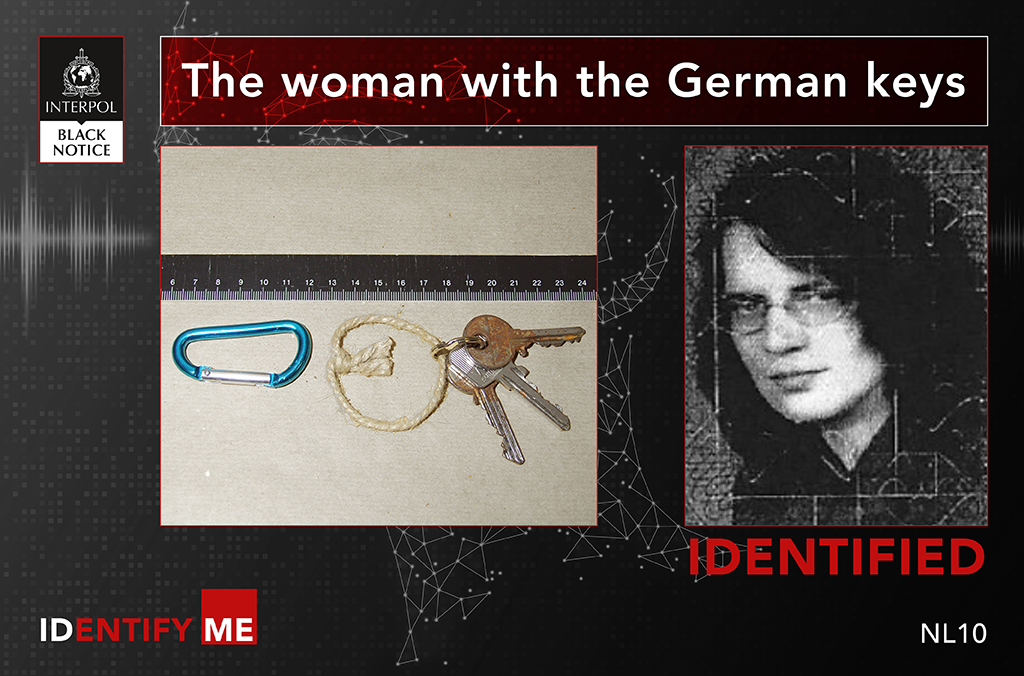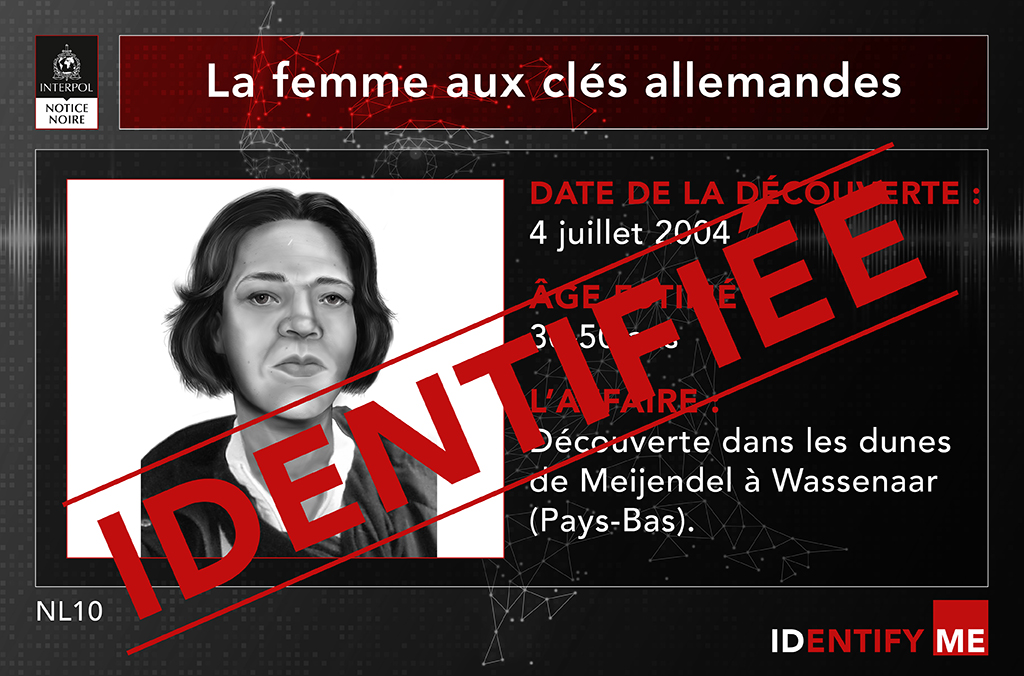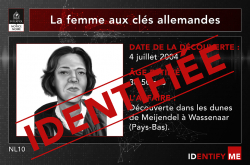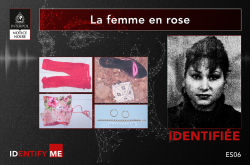LYON (France) – Le corps d’une femme retrouvé sur une plage néerlandaise en 2004 a pu être identifié grâce à une information transmise à la Police néerlandaise : il s’agit d’Eva Maria Pommer, une citoyenne allemande âgée de 35 ans au moment des faits.
Cette affaire fait partie de la campagne internationale Identify Me, coordonnée par INTERPOL en collaboration avec six pays européens (Allemagne, Belgique, Espagne, France, Italie et Pays-Bas) et visant à identifier des femmes dont les corps ont été retrouvés en Europe au cours des dernières décennies. Lancée en 2023, la campagne Identify Me regroupe 47 affaires, concernant toutes des femmes qui ont été assassinées ou qui sont décédées dans des circonstances suspectes ou inexpliquées.
L’une de ces affaires, connue sous le nom de « La femme aux clés allemandes », remonte au 4 juillet 2004, date à laquelle un homme se promenant dans les dunes près d’une plage isolée de la ville de Wassenaar, aux Pays-Bas, a aperçu une femme étendue sur le sable.
Malgré des enquêtes poussées, l’affaire n’a jamais été résolue et l’identité de la femme est restée entourée de mystère. À court de nouvelles pistes, les autorités néerlandaises ont confié l’affaire à INTERPOL, qui l’a intégrée à sa campagne Identify Me en 2024.
En 2025, l’affaire évolue lorsque l’équipe de la Police néerlandaise chargée des affaires non résolues et des personnes disparues, à la Haye, reçoit une information importante qui accélère l’enquête dans la ville allemande de Bottrop, non loin de la frontière néerlandaise. Des tests ADN s’ensuivent et confirment l’identité de la femme décédée : il s’agit d’Eva Maria Pommer, une ressortissante allemande.
Si la cause du décès n’est toujours pas connue, les enquêteurs n’excluent pas la possibilité d’un acte criminel. Les autorités néerlandaises poursuivent donc leur enquête et invitent toute personne détenant des informations sur Eva Maria Pommer, en particulier en lien avec l’été 2004, à se manifester.
Quatrième identification dans le cadre de l’initiative Identify Me
Cette découverte marque la quatrième identification réussie dans le contexte de la campagne Identify Me. Conçue par la Police néerlandaise pour attirer l’attention sur les affaires non résolues ayant des liens transnationaux présumés, l’initiative coordonnée par INTERPOL vise à publier les détails de ces affaires en ligne et à les diffuser dans les médias internationaux.
En parallèle de cet appel à témoins mondial, INTERPOL tire profit de son réseau de services chargés de l’application de la loi pour partager les données biométriques des affaires Identify Me avec ses 196 pays membres, lesquels sont invités à effectuer des recherches dans leurs bases de données nationales.
Le secrétaire général d’INTERPOL, M. Valdecy Urquiza, a déclaré :
« Cette récente identification est plus qu’une simple étape dans notre campagne en cours, c’est un témoignage de ce que nous pouvons accomplir lorsque les nations unissent leurs forces. Il est aussi important de reconnaître le dévouement de toutes les personnes ayant participé à cette affaire aux Pays-Bas et en Allemagne, dont l’étroite coopération a été essentielle à cette découverte. À mesure que nous progressons, nous pensons aux familles et aux proches des personnes disparues qui attendent toujours des réponses. Nous saluons leur courage et réaffirmons notre détermination collective à découvrir la vérité, peu importe le temps que cela prendra. »
Janny Knol, directrice de la Police nationale néerlandaise, a affirmé :
« Cette identification illustre l’importance de la collaboration et du partage d’informations entre les organisations de police du monde entier. En réalité, cette coopération est cruciale, surtout dans des affaires comme celles-ci. Nous sommes reconnaissants du rôle joué par INTERPOL dans la coopération policière internationale en général, et tout particulièrement dans la campagne Identify Me. À cela s’est ajouté la persévérance des enquêteurs néerlandais et allemands, qui ont permis à une femme de retrouver son identité. Nos pensées accompagnent toutes les familles qui ont enfin obtenu des réponses au sujet de leur proche disparue, ainsi que celles qui attendent toujours. »
Lancée en 2023, la campagne avait rapidement permis d’identifier Rita Roberts, une Britannique de 31 ans assassinée à Anvers en 1992. Les proches de Rita Roberts avaient appelé la ligne téléphonique dédiée après avoir reconnu le tatouage de la jeune femme dans les médias.
En 2025, une deuxième femme de 33 ans, Ainoha Izaga Ibieta Lima, a été identifiée lorsque les autorités paraguayennes ont constaté que des empreintes digitales de leurs bases de données concordaient avec celles enregistrées par l’Espagne dans une notice noire INTERPOL publiée dans le cadre de l’initiative Identify Me.
En 2025 également, en procédant à des vérifications dans sa base de données biométriques nationale, la Police turque a découvert les empreintes digitales associées au corps d’une femme retrouvée en Espagne en 2004. Les données concordaient avec celles d’une ressortissante russe, Liudmila Zavada, âgée de 31 ans au moment de son décès.
INTERPOL a pour la première fois dévoilé au public des extraits de ses notices noires dans le cadre de la campagne Identify Me afin de retrouver l’identité de ces femmes décédées. Ces notices sont utilisées pour diffuser des informations au niveau mondial sur des restes humains en vue de déterminer les circonstances de la mort de ces personnes et de les identifier.
Depuis 2021, INTERPOL met à la disposition des équipes d’enquête un nouvel outil mondial, la base de données I-Familia. En permettant l’identification de cadavres par des recherches ADN en parentalité au niveau international, cette base de données a déjà contribué à la résolution de 25 affaires. Le processus repose sur des contributions volontaires d’ADN par les proches, lesquelles sont uniquement utilisées pour identifier les personnes disparues et ne sont pas comparées dans les bases de données criminelles.
L’appel continue : 43 affaires encore non résolues
L’opération Identify Me se poursuit avec 43 affaires restantes concernant des femmes décédées non identifiées. Nous invitons quiconque pense avoir une information, et en particulier les personnes qui se souviennent d’une amie ou d’une parente disparue, à consulter la page dédiée Identify Me et à contacter à la fois INTERPOL et les autorités nationales concernées.
Si vous pensez avoir reconnu une proche parmi ces femmes décédées, vous pouvez aussi contacter votre police nationale, qui pourra ensuite se mettre en relation avec INTERPOL afin de réaliser une comparaison de profils génétiques à l’échelle internationale et peut-être apporter des réponses à votre famille.








